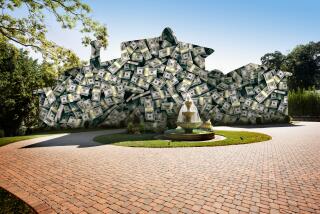Condo Owner Up in Air as Prices Dip, Assessment Rises
- Share via
Like millions of Californians, John Loney of Santa Ana recently opened his property tax bill from the county assessor, scanned the figures and prepared to file it away until one of the numbers caught his eye.
Then he got angry.
Loney saw that, according to the county assessor, the condominium he bought for $73,000 two years ago was now valued near $79,000, and his property taxes had risen accordingly.
Sale Prices Show Decline
But Loney knew that about a fifth of the condominiums in the 300-unit project were up for sale, many had been repossessed, many were vacant, and sale prices for several of the units had been between $65,000 and $70,000, not $79,000.
“This is one of the worst government ripoffs I’ve ever seen,” said Loney, a property appraiser for an Orange County-based mortgage firm.
“My tax bill should have been adjusted downward. Instead, they were asking me for more money. What’s worse, there’s so many people who pay their taxes through impounds collected with their mortgage payments to their lenders that they won’t even know that this is happening to them . . . . There are probably thousands of cases like mine across the state.”
Indeed, in one of the little-known side effects of Proposition 13, some property owners are routinely overcharged from a few bucks to $100 or more because their tax bills have not been adjusted to reflect depressed values in some locations.
“It goes back to Proposition 13,” said Orange County Treasurer-Tax Collector Robert Citron, “because that measure did not allow for downward adjustments.”
Citron, Orange County Assessor Brad Jacobs and officials at the state Board of Equalization in Sacramento said the 1978 ballot proposition and subsequent tax laws allow an automatic 2% increase in assessed value annually.
New construction and resales are reassessed at market value, but property owned by so-called “stay-putters” is limited to the 2% annual increase.
Assessors are required to review properties to see if downward adjustments should be made, but the law specifically exempts officials from having to examine every parcel in detail, recognizing that there is not enough manpower.
In short, the burden has been on individual taxpayers to find discrepancies and file appeals with their local tax assessors.
The bottom line: Unless appraisers who work for county assessors have spotted a downward trend in a particular tract or neighborhood, the maximum 2% increase in assessed value is applied to tax bills automatically.
“I’d say the number of properties in Orange County that have declined in value is maybe only a few tenths or hundredths of one percent,” said Jacobs, the tax assessor.
“It’s not easy to find these individual, isolated cases. There are 620,000 pieces of real property in the county . . . . We appreciate it when somebody comes in and tells us about one of these areas that has declined economically, because we don’t see them all.”
‘Condos Have Had Rough Time’
Jacobs said the problem involves mostly condominiums in individual projects.
“Condos have had a rough time in the marketplace. We do reassess them when they’re sold, but it’s very difficult to get a true picture of what’s going on in an individual complex. You can’t just go by one or two sales. There has to be a definite pattern, and in many of these condo projects sales are so few that there’s not much of a track record to go by,” Jacobs said.
“The number of units that decline is so small, however, that it’s what I call ‘noise’ in the system. It’s statistically insignificant. It has no measurable impact on county tax revenues.”
In 1984, Jacobs said, the county’s total assessed valuation was about $84 billion, 12% above 1983. Property tax revenues totaled $900 million, he said.
Meanwhile, Board of Equalization officials in Sacramento estimated that less than 1% of the state’s 8.9 million assessed properties or parcels declined in value recently.
Gordon P. Adelman, who oversee’s the board’s property tax operations, said, “I can see where it would be difficult to know about every single home or condo that may have a problem . . . the assessors do their best with the staffs they have. But, frankly, it’s still up to the individual taxpayer to file a protest, and that can take several months . . . .”
Matter of Principle
Adelman acknowledged that even if less than 1% of the assessed properties statewide declined in value last year, that would still mean that thousands of property owners could have been overcharged on their tax bills.
“I won’t say it isn’t happening,” he said. “I just haven’t heard any complaints or that it’s a major problem.”
However, John Loney said it’s a matter of principle.
“Millions of dollars are involved statewide, and I don’t think it’s right,” he said. “I’m going to file my own tax appeal in July, at the start of the appeals season. Then I’ll see how long it takes to get my money back. The assessor’s office just told me that it might take two months just to acknowledge a letter about the problem.”
More to Read
Sign up for Essential California
The most important California stories and recommendations in your inbox every morning.
You may occasionally receive promotional content from the Los Angeles Times.









